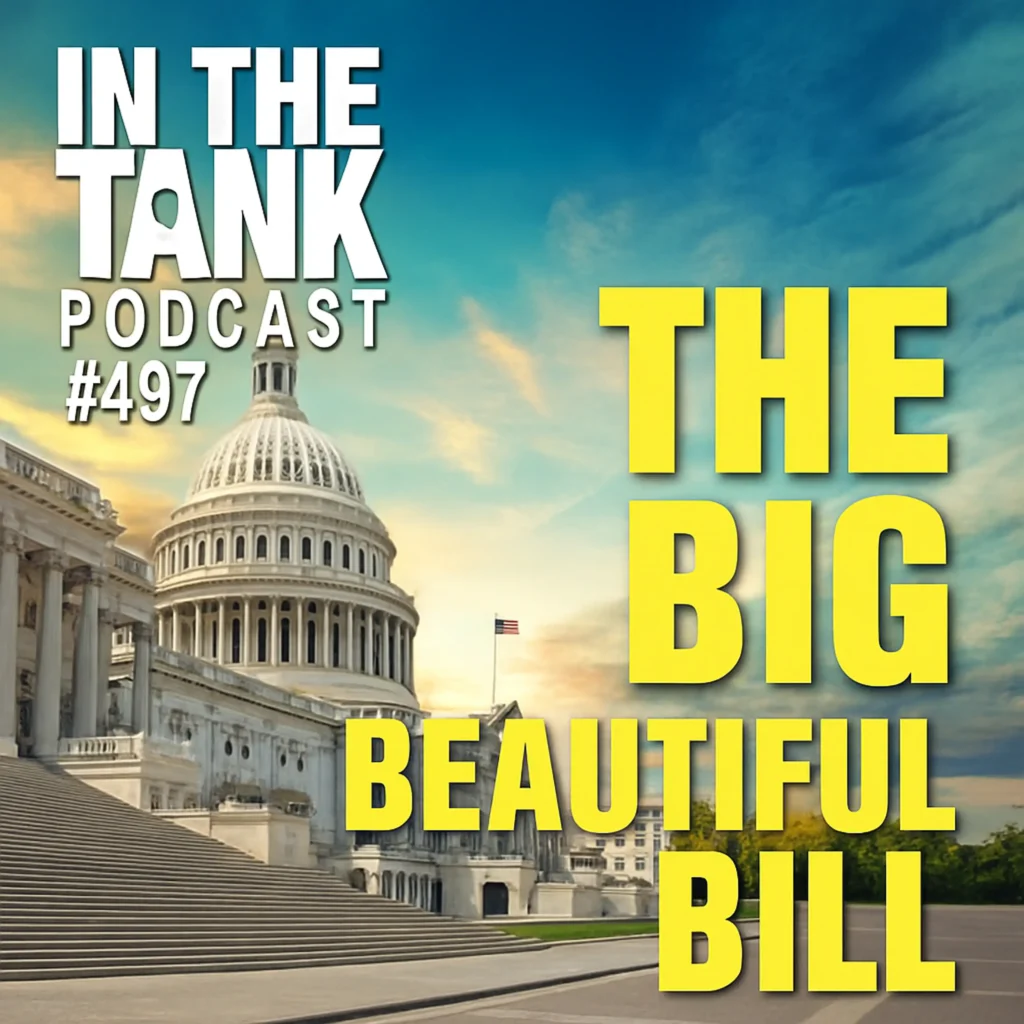The Political Tide Against a Fiscal Rescue
Forward this issue to your friends and urge them to subscribe.
Read all Life, Liberty, Property articles here, and full issues here and here.
IN THIS ISSUE:
- Video of the Week: Climate and Energy in Trump’s Big Beautiful Bill – The Climate Realism Show #158
- Bipartisan Pushback on Kansas City Stadium Deal
- Cartoon
- Bonus Video of the Week: STAND FOR FREEDOM! Heartland’s President James Taylor with a message for Europe.
The Political Tide Against a Fiscal Rescue
Last week I noted that even the U.S. economy, the best in the world, cannot support the current and upcoming federal debt. Here I explain the dismal political reasons why a reversal is so unlikely. Unless things change dramatically, there will be no fiscal rescue.
The problem is that there cannot be any bipartisan deal to prevent a catastrophic debt spiral, which I see as arriving within the next decade unless we begin to arrest it now through serious spending cuts. The opposition party does not benefit if the president and his party solve national problems, including existential ones such as this. Members of the opposition party perceive disasters while they are out of power as being in their political interest. They fight to the death against any attempt to cut spending, because it does them no good and causes them much harm politically.
(If you doubt that, just read this.)
The opposition party also believes in Modern Monetary Theory—as it is convenient to their political interests—which argues that the U.S. government can spend as much as it wants without harm to economy, because it has the power to print as much money as it takes to cover any deficit (which it must do to avert an open repudiation of debt). If that sounds like a recipe for inflation and ultimately hyperinflation, that is because it is exactly that.
Finally, the opposition party believes that higher spending always benefits them politically, except for defense spending when Republicans are in office. (The Democrats approve of defense bloat when they are in control of the government and can use it to benefit their interest groups.)
Hence, Trump and the congressional Republicans are on their own if they want to cut spending significantly and save the country and its government. Most of the Republicans probably view major spending cuts as political suicide, as the opposition (including the entire media complex) would trot out every possible real or imaginary “victim” of their “draconian cuts” that “benefit the rich at the expense of hardworking middle-class Americans.”
Cue up the commercials of House Speaker Mike Johnson gleefully pushing a wheelchair-bound granny over the edge of a cliff.
The “Big, Beautiful Bill” cannot implement the necessary comprehensive reforms, because those are not possible in a reconciliation bill. Full reform of the sort I am talking about would require legislation that could get past a Senate filibuster. That would require at least seven votes from the minority party, which the Republicans are not going to get. Hence, the political tide against real reform is irresistible.
The Republicans are certainly right about the likely political fallout of serious entitlement reform, and they have convinced themselves that the situation is not as dire as the numbers show, to salve their consciences as they tinker with the silverware in the dining car while the train roars out of control down the mountain. In this way they too are acting on their perceived political interests instead of what is good for the country, and in the present case that means failing to do what is absolutely necessary to avert a disaster.
Both parties are to blame, though the Democrats’ position is decisive in itself. If even a few of them were to support spending cuts, the nation and its economy could be saved. That has not happened at any point thus far, and there are no signs of that changing.
That leaves small moves such as the current recission bill, which would reduce annual federal spending by around 0.02 percent. Such a minute change would be symbolic only, yet it could mark an important change were it to pass and embolden Republicans to make real spending cuts.
Unfortunately, I cannot see that happening. It seems that this dynamic will not change until the crisis arrives. At that point, it will be too late to save the current system as Trump is trying to do.
The current U.S. (and global) economic system is not a free-market order by any means, but what would arrive in the wake of an economic catastrophe and collapse of the federal government’s authority and capability to protect the nation from invasion and internal civil chaos is anybody’s guess.
I would much rather not find out. I would prefer to see the government implement the necessary fiscal, regulatory, and governance reforms in an orderly way.
That, as I have argued before, is what Trump is trying to do. It probably has to happen this year or it will not work.
That would require a major change in the two parties’ views on federal spending, both its current trajectory and the premises behind the enormous increases in entitlement spending, which are driving the massive deficits.
Like the Cowardly Lion in The Wizard of Oz, the majority party would have to find courage. The opposition party would have to find a brain. Neither party appears to have a heart, but we can cut the deficit without that.
Trump and his team appear to understand these grim truths. Trump, however, is no wizard—neither the magical one nor the con man. Congress and the Federal Reserve are not going to perceive the reality (no brain) and act on it (no courage).
Entitlements are the main problem. Trump’s pledge not to touch Social Security or Medicare at present is workable and in fact wise, in my view, because substantial cuts to those programs would be the equivalent of a repudiation of government debt, an obligation the government took on when it began taking money from people’s paychecks and promising to pay it back at an economic return far, far below what people could gain by investing it in the private sector. Debt repudiation is death to a government’s credibility.
Trump is right to keep that off the table. That stricture, however, leaves an enormous amount of money on that table, in entitlements such as Medicaid and food stamps. Sufficient cuts to those programs could forestall the disaster.
The media and other opposition party elements and socialists would characterize such benefit cuts as breaking a promise by the federal government. The pledges to fund Medicaid and food stamps are completely different, however, from those for Social Security and Medicare. The Medicaid payroll tax was a promise to workers that the government would spend it on other people, not on the workers themselves.
As one of the workers who paid in to that system for decades, I am certain that I am by no means an outlier in thinking that bringing on a fiscal and economic catastrophe in order to keep the promise of spending my money on a bloated program that has contributed greatly to the ruination of the nation’s entire health care system is not a good trade. It is overwhelmingly likely that the vast majority of workers would prefer elimination of Medicaid altogether if it would avert this disaster.
The promise to use taxpayer money to provide Medicaid, food stamps, and the like was always conditional, based on an ability to pay it. That ability is now gone. The spirit is willing, but the coffers are empty.
However, even talking about merely eliminating the most blatant fraud and waste in those programs results in instant political destruction of those why suggest it. Real reform would require a combination of courage and brains highly uncommon among members of Congress.
Given all these observations, a sensible and peaceful resolution to the nation’s fiscal problems seems extremely unlikely.
Source: Racket News

Video of the Week
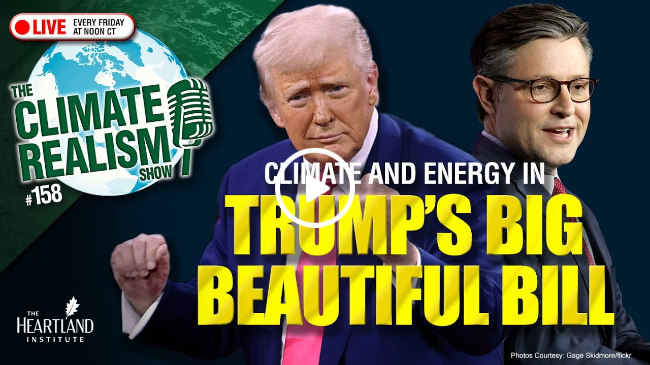

Bipartisan Pushback on Kansas City Stadium Deal

The Kansas City Chiefs NFL pro football team and Major League Baseball’s Kansas City Royals have been struggling with the state of Missouri over a hoped-for stadium deal—meaning, a big taxpayer subsidy for the two organizations. Both political parties are balking, Front Office Sports reports:
Even in a sharply divided political climate, opposing stadium funding has become a bipartisan issue, at least in Missouri.
Soon after Gov. Mike Kehoe called a June 2 special legislative session, in part to review a potential stadium bond measure for the NFL’s Chiefs and MLB’s Royals, opposition has mounted from both the political right and left to the effort and potentially could derail it.
Conservative Republican state legislators are taking a populist, taxpayer-fairness position:
The state’s conservative Freedom Caucus has said it is a “hard no” on whatit considers a billionaire bailout. The bill under consideration would allow the teams to bond up to the annual amount they generate in state tax revenue over 30 years, in turn funding up to half of new or upgraded stadiums. The caucus, however, is seeking broad-based tax relief and has threatened to tie up the bill in procedural blocks.
“If Gov. Kehoe and legislative leaders insist on using taxpayers’ hard-earned dollars for a half billion-dollar (or more) handout to billionaire sports team owners in a standalone bill, the Missouri Freedom Caucus will vote against such a proposal and will consider utilizing any tools at its disposal to stop it,” the organization said.
Missouri Democrats are engaging in explicit logrolling, conditioning their support on more taxpayer money to be sent directly to their interest groups:
Democrats, meanwhile, have a separate objection that Kehoe’s bills for the special session include just $25 million in emergency disaster recovery funds for a St. Louis area that was recently battered by tornadoes—an amount far less than what’s contemplated for the stadiums.
“The [stadium] conversation can’t even begin until serious disaster relief is considered,” state Sen. Stephen Webber told the Missouri Independent. “Why do I care about a billionaire’s stadium when people have lost their homes? There’s absolutely no way we’re going to serve a billionaire a feast and leave crumbs for people who just lost their homes. That’s not happening.”
Missouri had set up a bond program for a potential deal, which expires at the end of this month. That adds to the state government’s urgency in completing a subsidy deal, on top of the fact that neighboring Kansas, just across the river, “has already made competing pitches to bring the Chiefs and Royals across the state border,” Front Office Sports reports.
The contiguity of the two jurisdictions competing for these two franchises emphasizes the dynamic in these negotiations. The team owners can pit one state against the other, and the competition brings them a much higher subsidy than they could hope to get without the threat of moving across the border.
The same is true, however, everywhere a stadium deal nears the end of its term or a team’s owners decide that their facility is no longer new and fancy enough to impress the owners’ friends and acquaintances, live up to their self-image (however grandiose), and show other owners around the league just who is the best of the best.
The city and state governments, meanwhile have ego problems of their own. No city or state chief executive wants to be the big idiot who let a beloved sports team get away. Seldom does a government stand firm and let the team move without an intense effort to keep it. The Oklahoma City Thunder, now in the NBA finals, were the Seattle Supersonics until 2008, when they relocated to the Sooner State because Seattle and the state of Washington refused to give the team’s owner, Starbucks CEO Howard Schultz, money for a stadium renovation.
Of course, Seattle and Washington wanted to keep the Supersonics; they just flubbed it, apparently hoping that the courts would force the team to stay. Governments generally conduct cost-benefit analyses of these proposals and find that, lo and behold, the deal will create jobs and bring in much more tax revenue through new business than is lost through the subsidy. That has led to the current mania in which these stadium deals have ballooned to include “entertainment districts” that ditto the jobs-and-revenue myth and cost even more.
The public, the press, the local business community, and the local and state governments largely pretend to believe these dreams, because they all really want the team for the sake of civic pride. It is true that once-woebegone cities such as Oklahoma City and Indianapolis have experienced dynamic growth after using taxpayer subsidies to lure pro sports teams. People do get excited about success, and when a city wins a sports team, the people are happy with that, even though they are probably getting a bad deal.
I won’t argue that those cities would have had the same growth without the sports expansions; there is no way to prove that. Indianapolis grew from a sleepy backwater into a, well, major league city once the Colts (NFL) and Pacers (ABA, then NBA) came to town. The population of the Indianapolis metro area grew from 838,000 in 1980 to more than 1.9 million today. Oklahoma City has consciously followed Indianapolis’s blueprint, expanding from one downtown hotel to 30 since 1993.
In the case of Indianapolis, the population growth occurred in the suburbs, as did much of the economic growth, and the same is likely to happen in Oklahoma City, where 709,000 of the metro area’s one million people live within the city limits. The residents of these cities may be happy with their sports team deals, but the suburbanites have much more to be happy about. Chances are, then, that the Chiefs and Royals will get what they want, western Missouri and eastern Kansas pro sports fans will get what they want, the politicians will get what they want, and the public will get to pay for it. That is politics in its very essence.
Sources: Front Office Sports; The Indianapolis Star
NEW Heartland Policy Study
‘The CSDDD is the greatest threat to America’s sovereignty since the fall of the Soviet Union.’

via Townhall
Bonus Video of the Week
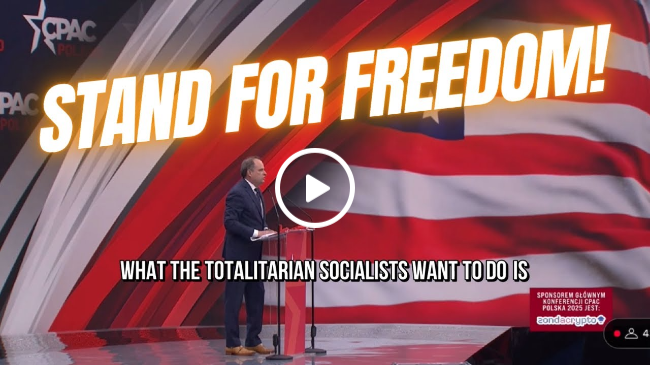
Heartland Institute President James Taylor electrifies CPAC Poland with a rallying cry for faith, family, and freedom. Speaking in Jasionka on May 27, 2025, Taylor salutes Poland’s centuries-long defiance of tyranny and urges conservatives across Europe to “stand tall for freedom” in the face of mounting EU pressure to adopt Net-Zero policies. He reminds the crowd that for most of recorded history the climate has been warmer than today, yet humanity thrived, and he warns that “totalitarian socialists” in Brussels threaten both prosperity and national sovereignty.
Taylor lays out a blueprint for economic revival built on abundant coal, natural gas, and nuclear power, echoing the energy boom unleashed in the United States under President Trump. Finally, he calls on every Pole—and every European—to raise their flag high and join a growing international movement for liberty and independent nation-states.

Contact Us
The Heartland Institute
3939 North Wilke Road
Arlington Heights, IL 60004
p: 312/377-4000
f: 312/277-4122
e: [email protected]
Website: Heartland.org






